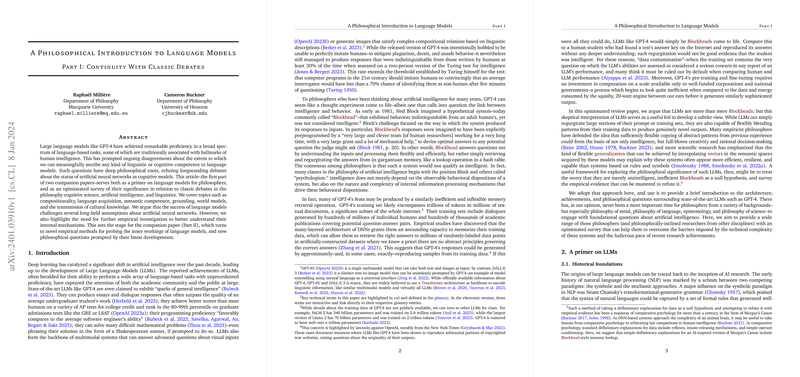Introduction to LLMs and Philosophy
LLMs, particularly LLMs, have made significant strides in the field of artificial intelligence, displaying abilities in various language-based tasks often correlated with human intellect. This development has sparked debates on whether these models truly possess linguistic or cognitive competencies. The core of such discussions can be traced back to classic philosophical inquiries regarding the cognitive processes of machines. The present analysis scrutinizes the intersection of LLMs and timeless philosophical debates, shedding light on both the capabilities and the rooted assumptions concerning computational models in cognitive science and linguistics.
Understanding LLM Capabilities
The evolution of LLMs such as GPT-4, with their remarkable proficiency in producing human-like text, has captured the interest of experts and the wider public. GPT-4's achievements in various standard tests and its inherent ability to generate complex language tasks point toward an advanced level of "general intelligence." Impressively, in specific settings, GPT-4's responses are indistinguishable from those authored by humans, surpassing the benchmarks Alan Turing suggested for a machine to effectively mimic human intelligence. These outcomes resonate with historic thought experiments like "Blockhead," pushing us to reconsider the link between observable intelligence and underlying cognitive processes.
Philosophical Reflections on LLMs
The impressive feats of LLMs like GPT-4 raise the curtain to a stage where philosophical standpoints merge with empirical inquiry, reinvigorating discussions around cognitive modeling and intelligence. Philosophers have long debated the necessity of complex internal mechanisms for intelligent behavior—a conversation only intensified by the data-driven approaches of LLMs. GPT-4 operates on vast datasets, fueling speculations that its sophistication may stem from simple data retrieval rather than a deeper, more flexible understanding. The critical examination, therefore, pivots on whether its internal mechanisms align with intelligent behavior or recall the limitations of "Blockhead."
Forward-Thinking: Empirical Investigations and the Future
Evaluating LLMs extends beyond statistical successes and steps into the empirical field to probe their internal workings. The need for further research is clear. We must explore not just the behavior demonstrated by LLMs but also the intricacies of their data processing. To better grasp their true cognitive resemblance, researchers must develop experimental methods that reveal underlying representations and computations. Such investigative strides promise a richer comprehension of LLMs and pose new philosophical questions in light of their evolving capabilities.
In conclusion, LLMs like GPT-4 challenge well-established assumptions about learning mechanisms and intelligence featured in artificial neural networks. Their success ushers in a new era of philosophical scrutiny and empirical paper, where cognitive archetypes are dissected and reassembled. While advancements in LLMs hint at more than mere regurgitation of learned patterns, the narrative is complex, requiring a nuanced understanding of their operational fabric—an endeavor unfolding within the philosophical and technical panorama of AI.
